Making the popular Indian dessert known as Carrot Halwa (a.k.a. Gajar Ka Halwa in Hindi or Gajrela in Punjabi) is so simple when you use my detailed step-by-step guide and video! Whether you make it using the traditional stovetop method, or take some shortcuts by using milkmaid, khoya or the Instant Pot. I have you covered all with detailed step-by-step photos in this helpful recipe post sharing 4 variations or ways to make this decadent sweet.
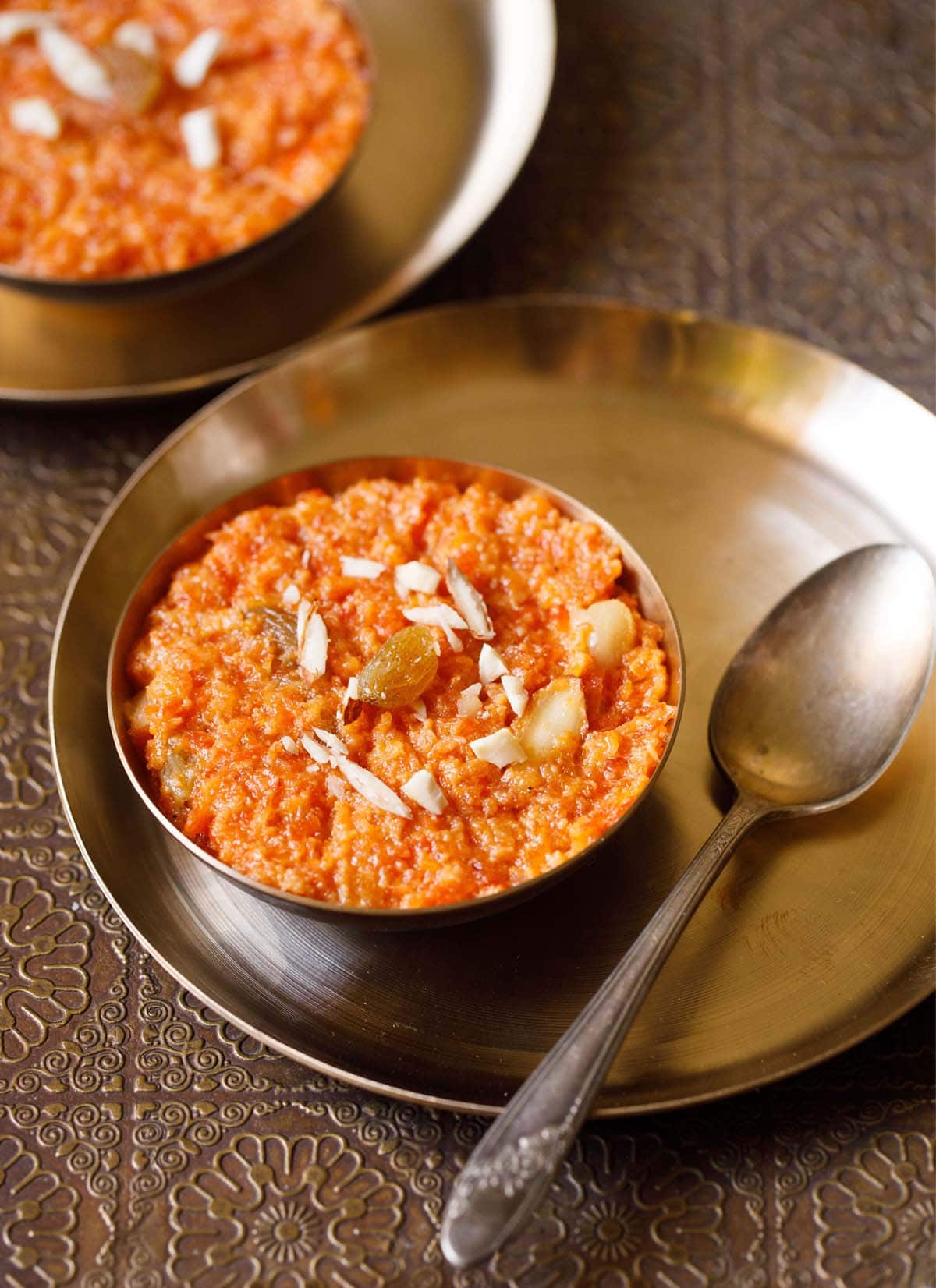
Table of Contents
What is Halwa
The word halwa comes from the Arabic word for “sweet,” and refers to desserts that are cooked with ghee and sugar. Whether made with noodles (vermicelli), lentils (moong dal), grains (like semolina), or vegetables (like carrots or beets), Indian halwa is a pudding that is absolutely delectable.
Contrary to popular belief, Indian halwa is different from Middle Eastern halva, which is a candy made primarily from sesame seeds.
Halwa is a yummy dessert that is reserved for celebratory occasions. It isn’t difficult to make, but it does tend to take a bit of time. If you’d like to make gajar ka halwa more of a regular occurrence, consider using one of my genius shortcuts listed below!
What is Carrot Halwa
Carrot halwa is a popular sweet made in North India, and it is especially popular during winters. The traditional gajar ka halwa recipe is made with only carrots, whole (full-fat) milk, ghee and sugar; there’s no need for khoya (evaporated milk solids) or condensed milk.
If you prefer using either khoya or milkmaid (sweetened condensed milk), skip to the appropriate section below to learn how!
I prefer to use red Delhi carrots to make the halwa, as they are tender and juicy. That said, you can use any carrots – red, orange, or even black – so long as they are not fibrous, stringy, or hard.
One of the reasons that I love making carrot halwa is that it has a pretty long shelf life. I can make a batch that’ll last for upwards of 10 days in the fridge, meaning we always have something sweet to snack on after our meals.
How To Make Gajar Halwa
Prep and Grate Carrots
1. First rinse 650 grams carrots (8 to 9 medium-sized tender, juicy carrots or 6 to 7 long carrots) a few times in water.
Drain the water. Peel the carrots using a vegetable peeler. Set the peeled carrots aside.
Ensure that the carrots are juicy and tender. You could use any variety of carrots (red or orange), but they should be tender.
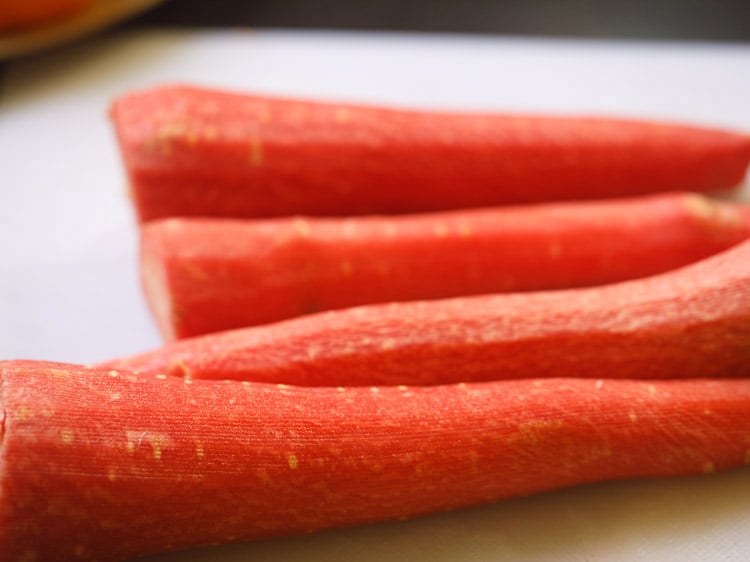
2. Next, grate the carrots with a box grater or in a food processor. You can measure the grated carrots with a standard measuring cup and you will need about 4 to 4.5 cups of grated carrots.
Grating carrots in a food processor is much easier than grating with a box grater or a hand-held grater.
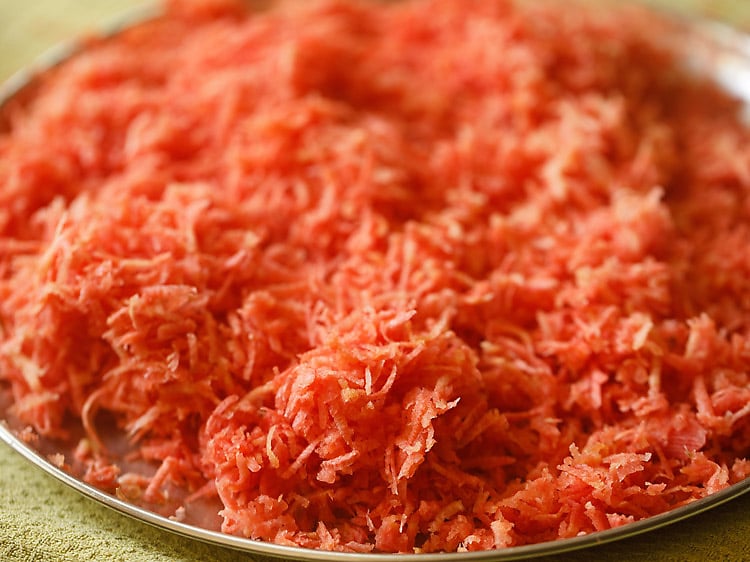
Cook Carrots
3. In a heavy kadai or wok, add all of the grated carrots.
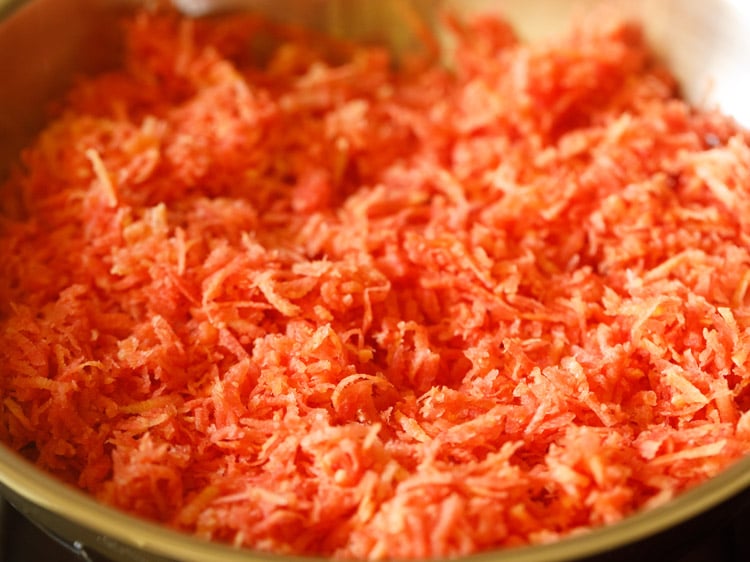
4. Pour in 4 cups full-fat milk. Switch on the burner.
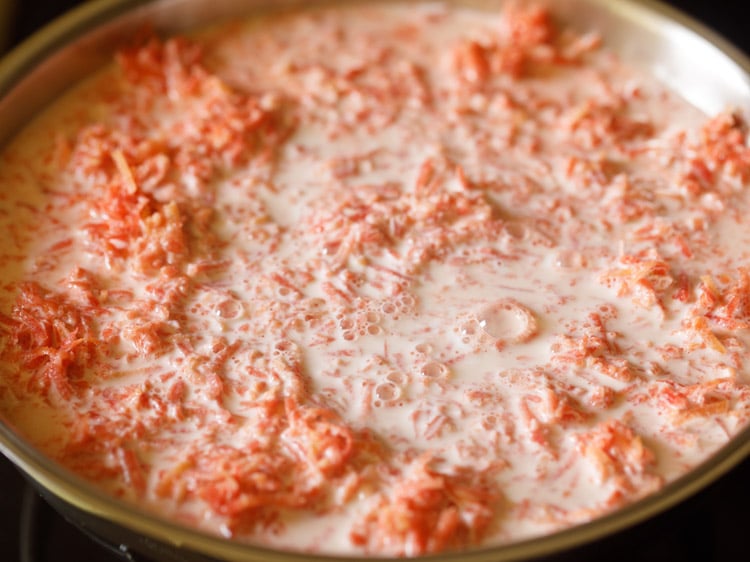
5. Mix the grated carrots and milk together.
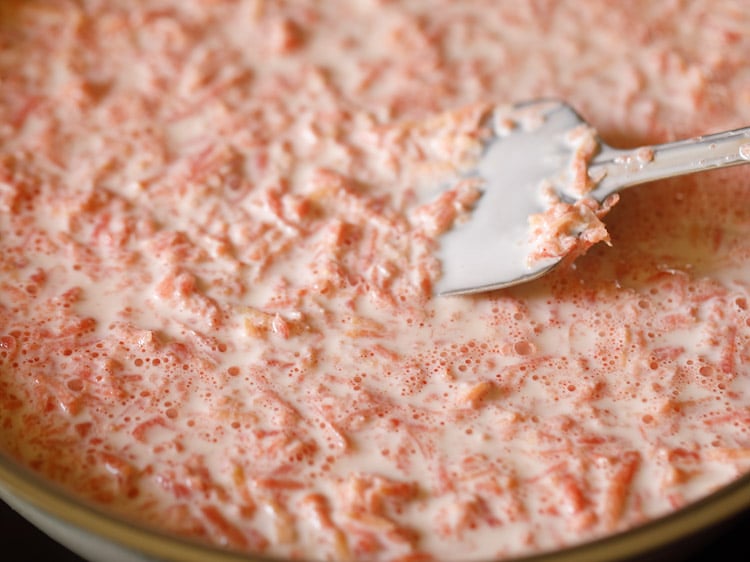
6. Cook this mixture on a low-medium heat. After a few minutes, the milk will begin to froth and then start slowly reducing.
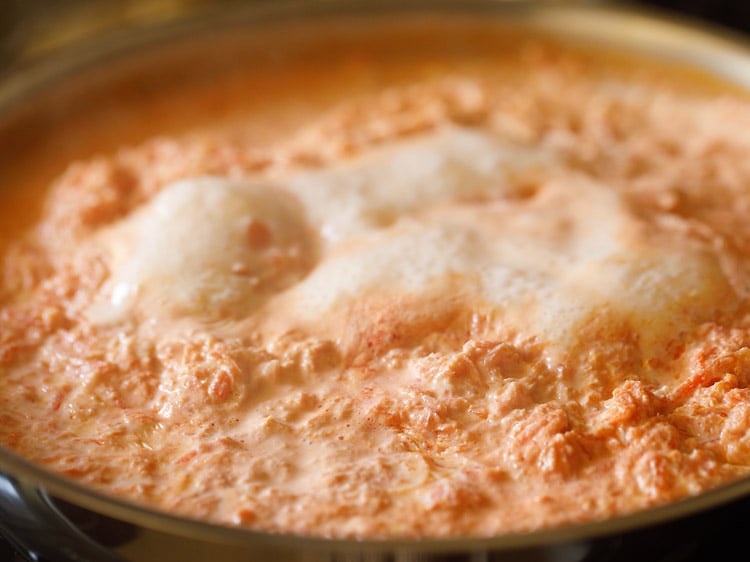
7. Keep stirring this halwa mixture often, scraping the sides of the kadai to remove the evaporated milk solids. Stir the milk solids into the cooking mixture.
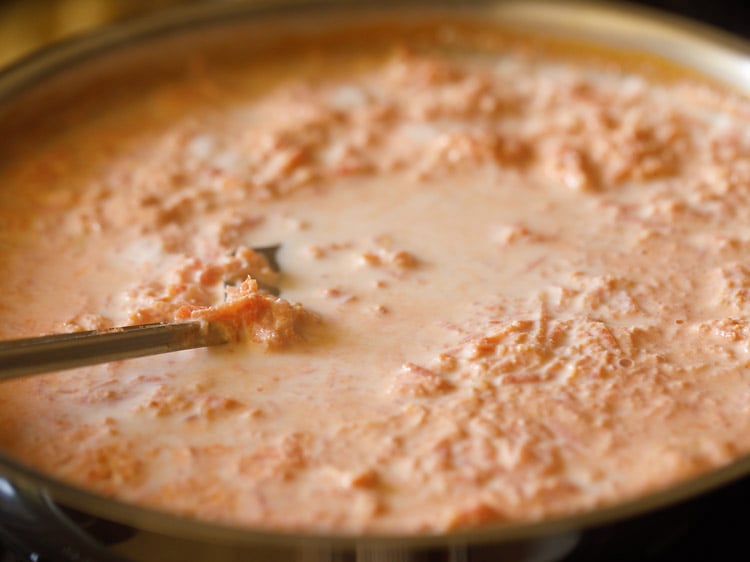
8. Cook the carrot and milk mixture until the liquid is reduced by 75%.
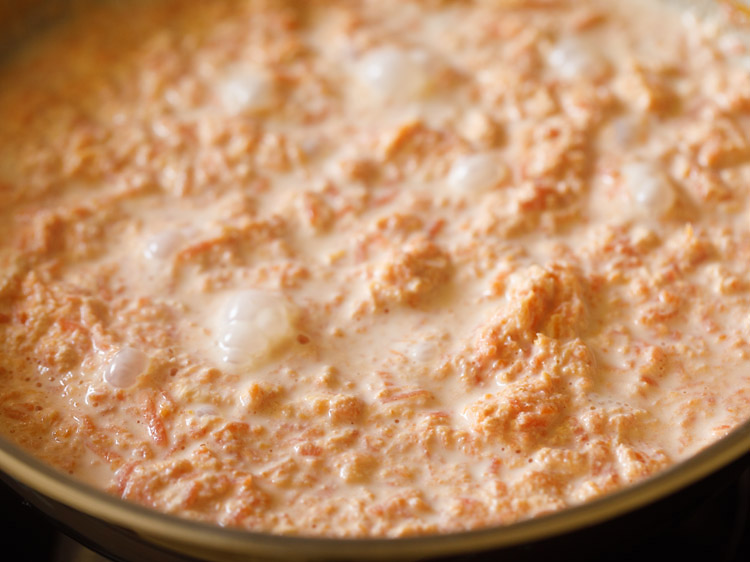
Make Gajar Halwa
9. Add 4 tablespoons ghee (clarified butter). Note that some milk will be there when you add the ghee.
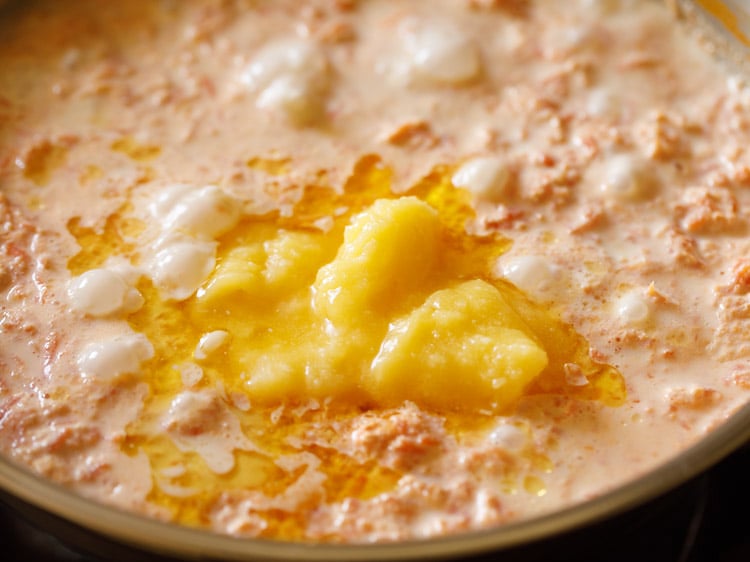
10. Mix very well.
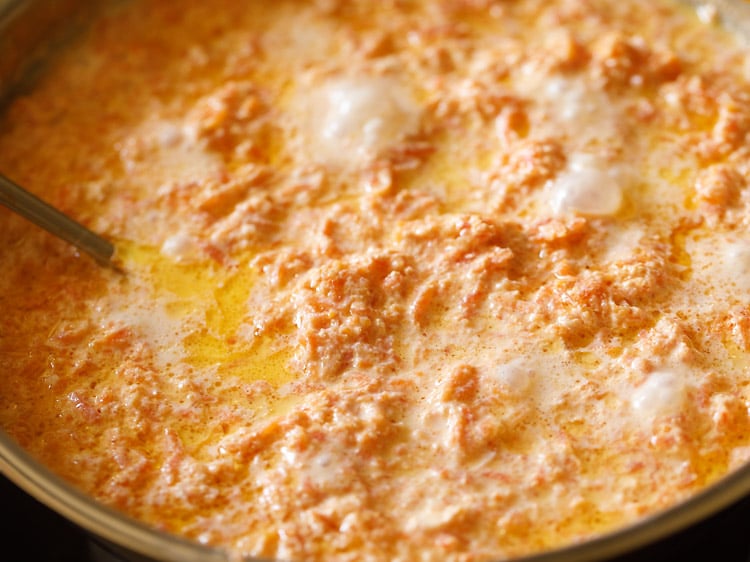
11. Next, add 10 to 12 tablespoons sugar, or to taste.
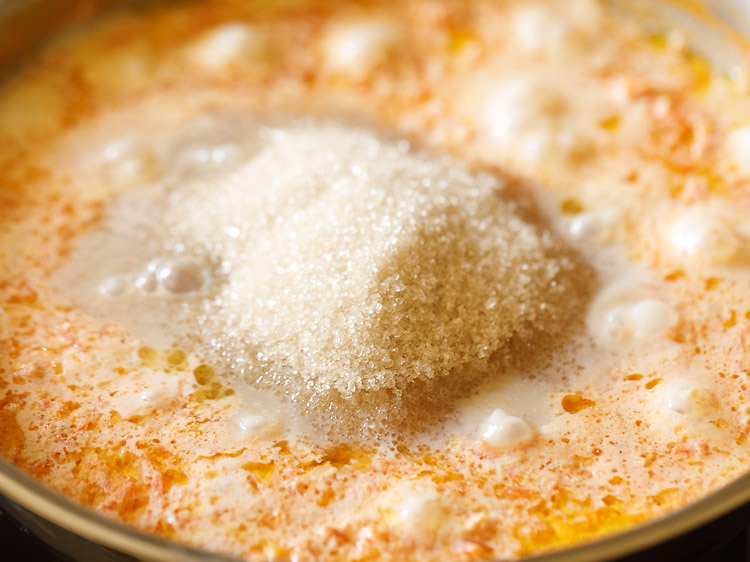
12. Add cardamom powder – 5 to 6 green cardamom pods powdered finely in a mortar-pestle, or about ½ to 1 teaspoon pre-ground cardamom powder.
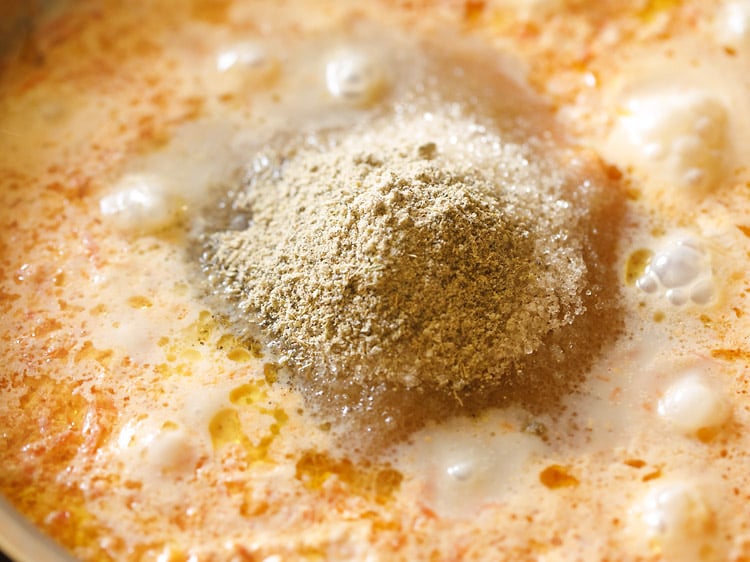
13. Mix very well.
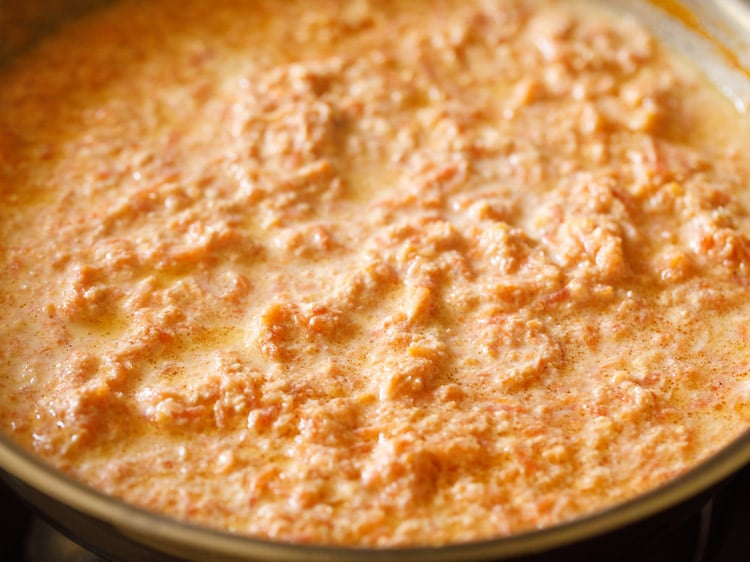
14. Continue to simmer on a low flame, stirring often.
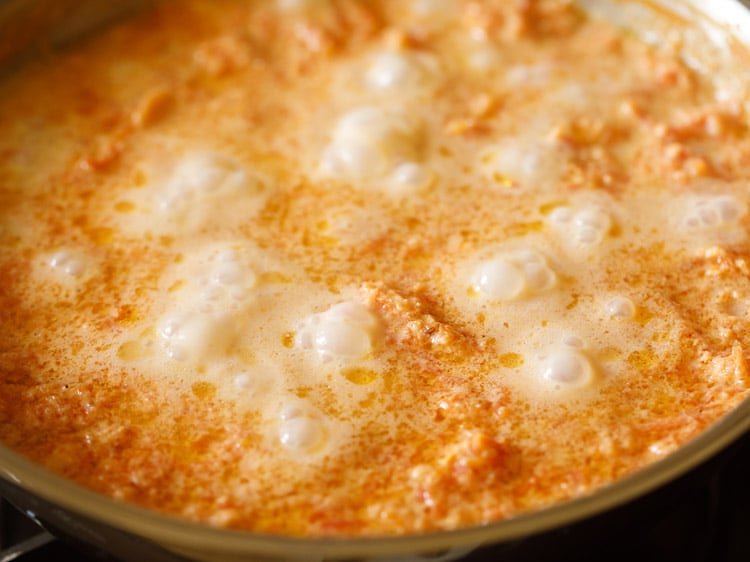
15. Simmer till the gajar ka halwa mixture starts to thicken and reduces more. Stir at intervals.
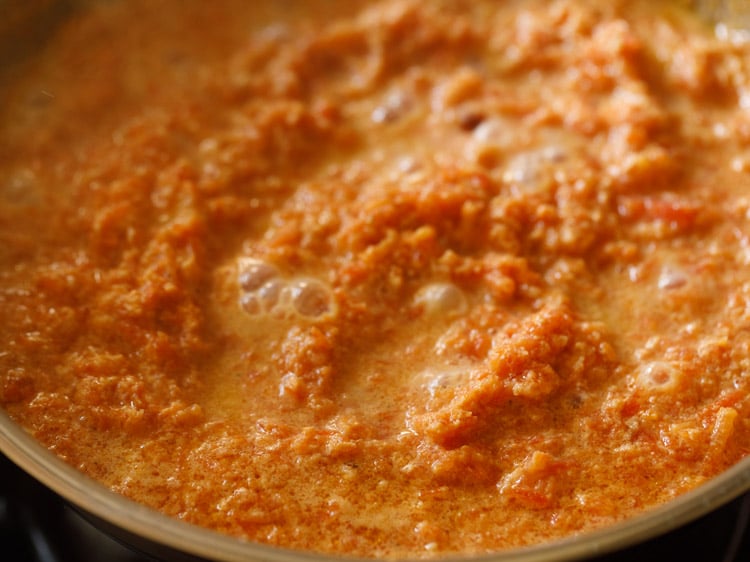
16. When the halwa has reduced to a pudding-like consistency, add nuts and dry fruits of your choice. I have added 12 cashews, 12 almonds, and 2 tablespoons golden raisins.
Note: Chop the nuts before you add. Raisins can be kept whole. If using saffron, then you can add at this step.
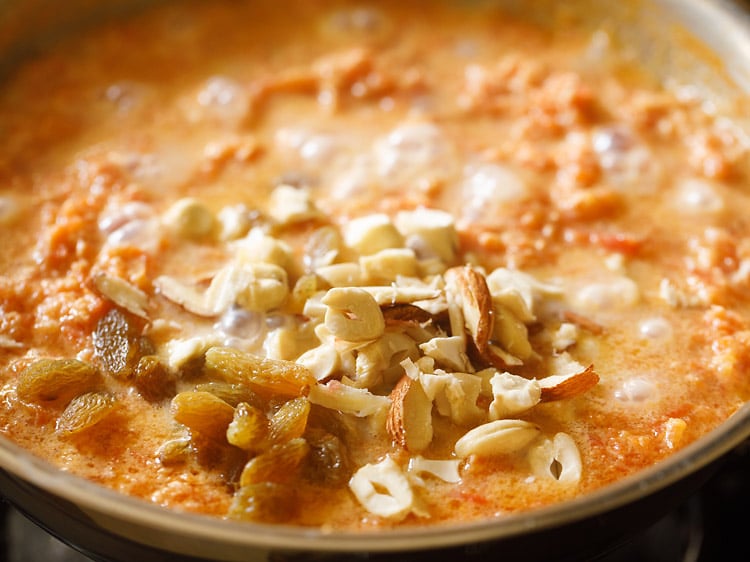
17. Mix again and continue to stir and simmer.
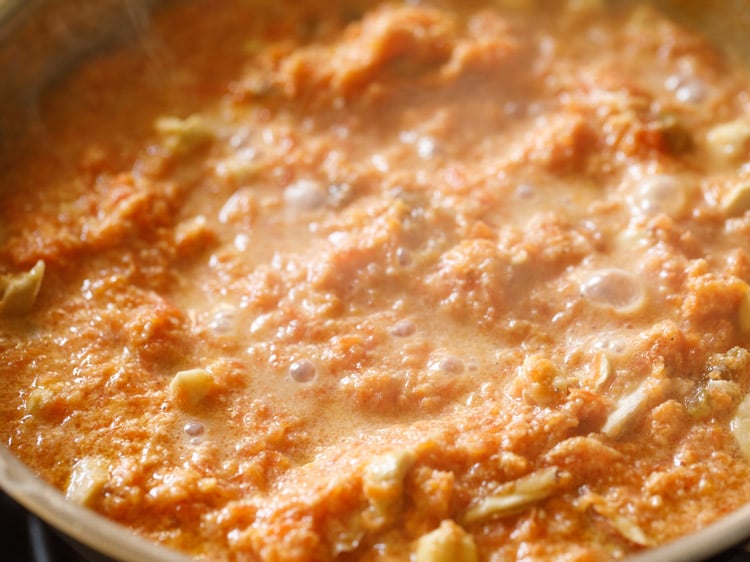
18. Simmer till the halwa mixture becomes dry. The milk should evaporate completely and you will see fine milk solids in the mixture. You will also see some ghee being released from the sides.
Remember to scrape the milk solids stuck at the sides of the kadai or pan and add them back to the carrot halwa. Some moisture is also fine in the halwa.
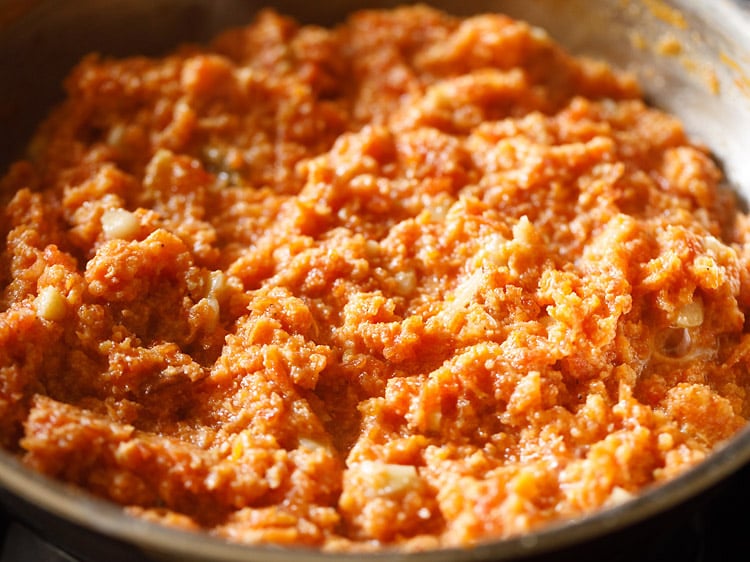
19. Serve gajar ka halwa warm from the pan. Refrigerate any leftovers, warming them before serving. Garnish with some chopped dry fruits while serving.
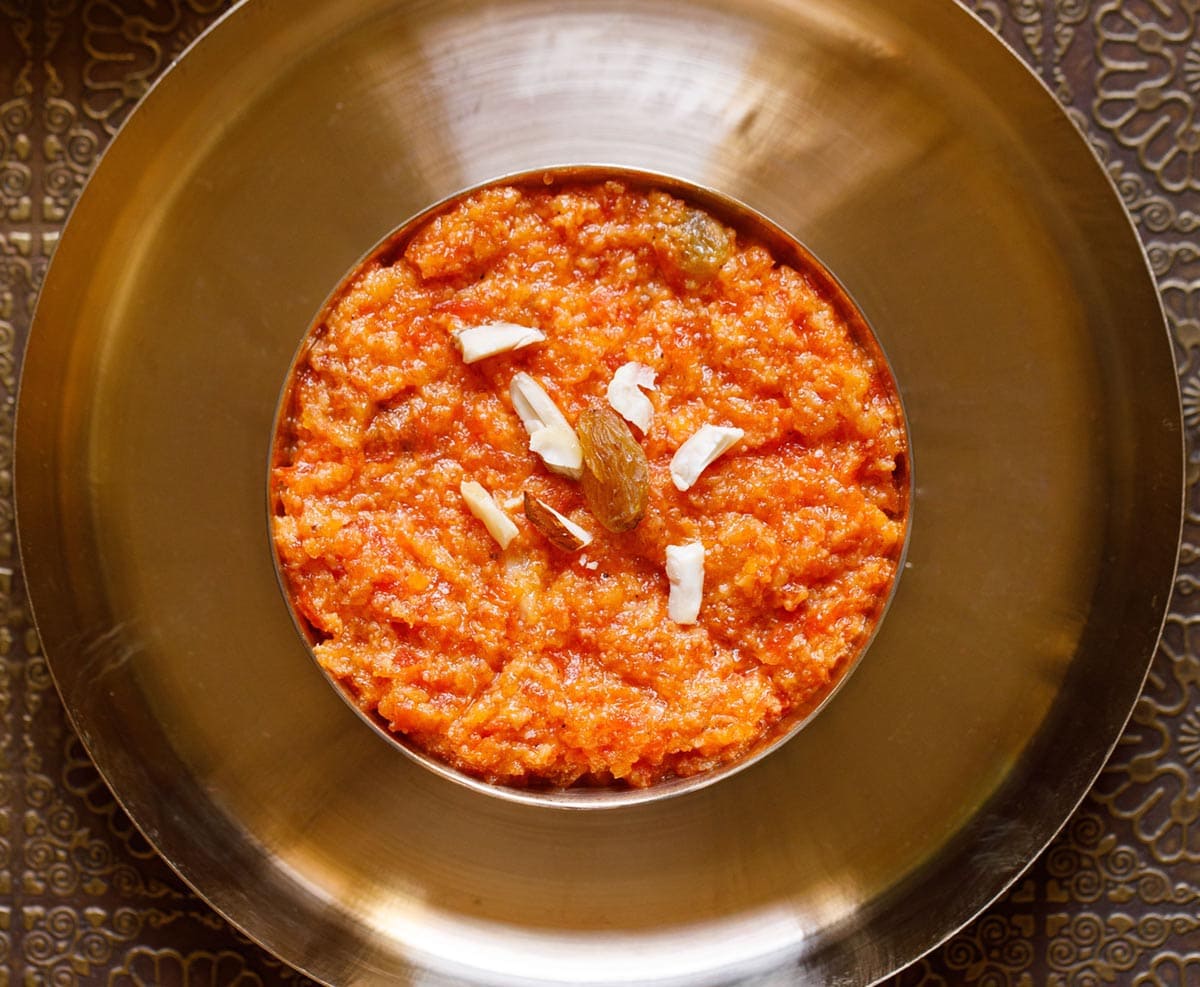
Carrot Halwa With Milkmaid
This is a quick and easy version of carrot halwa made with milkmaid or sweetened condensed milk. I am adding this recipe as a few readers did ask me on how to make carrot halwa with milkmaid.
Winter is the time of long, tender and juicy carrots in India. So when I get them, I often end up making halwa with them.
I usually make the halwa with the traditional method of cooking the grated carrots in milk (the above method). But on occasions I also take a shortcut of making gajar halwa with condensed milk. This is a quick method than the traditional one and takes less time.
I did use 1.5 kgs carrots and it took about 45 mins to make the halwa. So if you halve or reduce the proportion, it will be much quicker. I used sweetened condensed milk (Nestle Milkmaid) and did not have to add any sugar.
You Will Need
- 1.5 kg carrots – approximate 9 cups tightly packed grated carrots
- 6 tablespoon ghee (clarified butter)
- 1.5 to 2 teaspoons cardamom powder or 8 to 9 green cardamoms – powdered in a mortar-pestle
- 1 tin sweetened condensed milk – I used nestle milkmaid, 400 grams
- sugar as required, optional
- ⅓ cup cashews
- ⅓ cup golden raisins
How to Make
To make carrot halwa with milkmaid or condensed milk, follow these steps:
1. Melt 6 tablespoons ghee in a heavy kadai or thick bottomed skillet or pan. Add in 9 cups of tightly packed grated carrots.
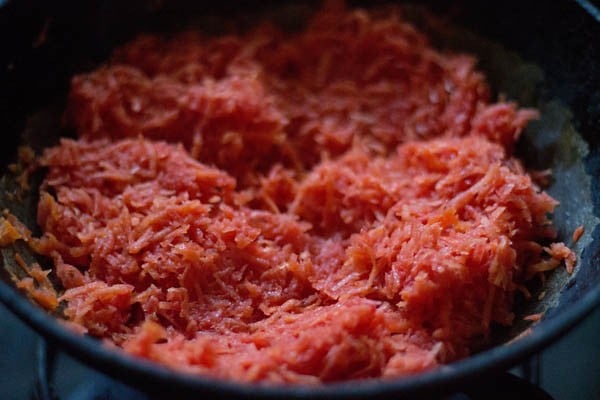
2. Sauté the carrots until they turn tender and are cooked, about 15 to 20 minutes on low heat. Stir often.
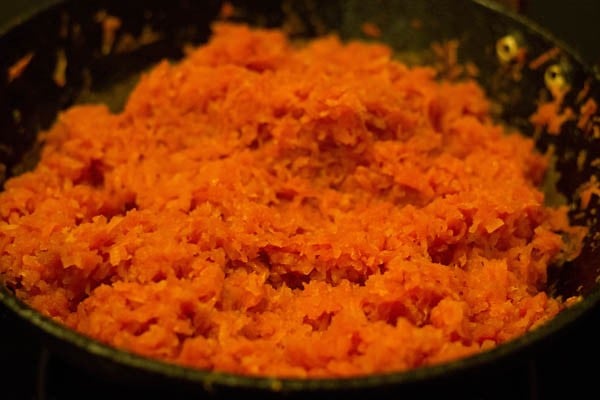
3. Pour in an entire can of milkmaid or sweetened condensed milk (400 grams).
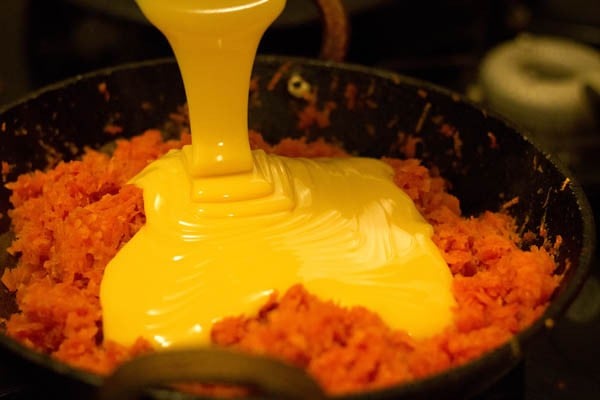
4. Mix thoroughly.
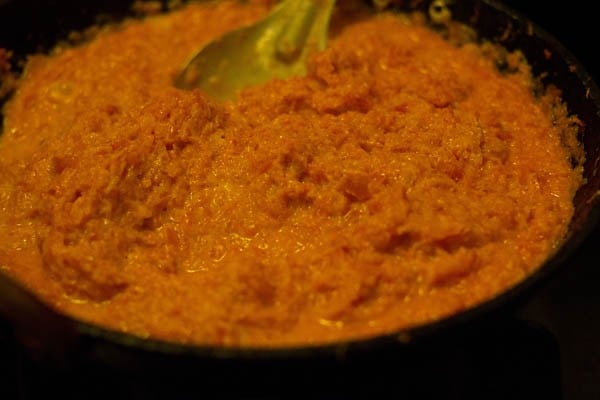
5. Add 1.5 to 2 teaspoons cardamom powder, ⅓ cup raisins and ⅓ cup cashews.
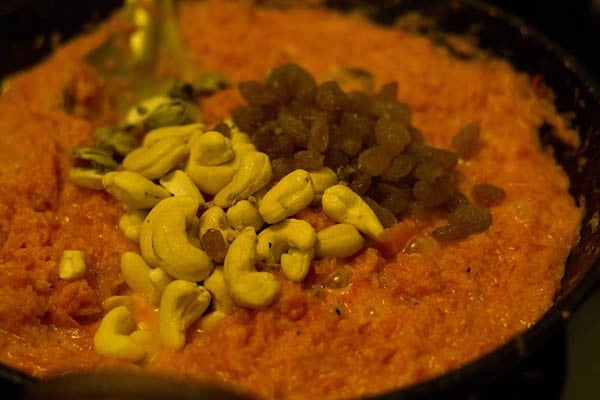
6. Mix well and simmer gajar ka halwa on a low heat. Stir often at intervals until the mixture thickens, reduces and dries up.
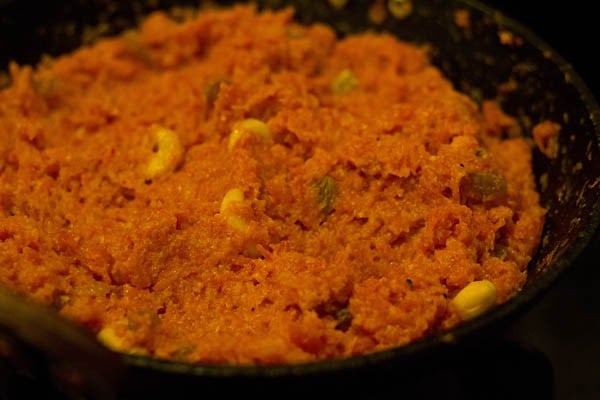
7. Serve carrot halwa hot or warm or chilled.
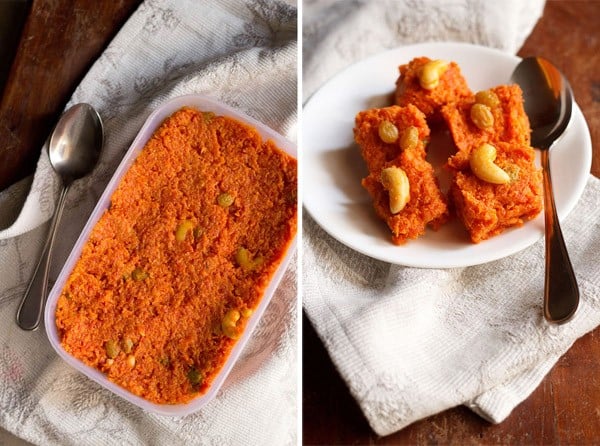
Gajar ka Halwa With Khoya
This carrot halwa variant is a delicious, quick method to make carrot halwa with khoya or mawa (milk solids), fresh tender carrots, sugar, ghee and nuts.
Khoya (or evaporated milk solids) gives a lovely texture and flavor to this halwa. I have used homemade khoya to make this treat but you can also use store-bought khoya.
Gajar halwa is made quite often at our place during winters. During winters it is a different fun altogether to eat a piping hot bowl of halwa.
Ingredients
- 1.5 kilogram carrots or 9 cups tightly packed grated carrots
- 6 tablespoons Ghee or clarified butter
- 2 cups khoya or mawa – grated or crumbled (evaporated milk solids) or 400 to 410 grams
- 1 to 1.25 cups sugar or add as required
- 1.5 to 2 teaspoons cardamom powder or 8 to 9 green cardamoms – powdered in a mortar-pestle
- 1 tablespoon pistachios, chopped or slivered – optional
- ⅓ cup cashews, or add as required
- ⅓ cup golden raisins or add as required
Method
1. Heat 6 tablespoons ghee in a deep bottomed heavy pan or kadai. Add 9 cups tightly packed grated carrots.
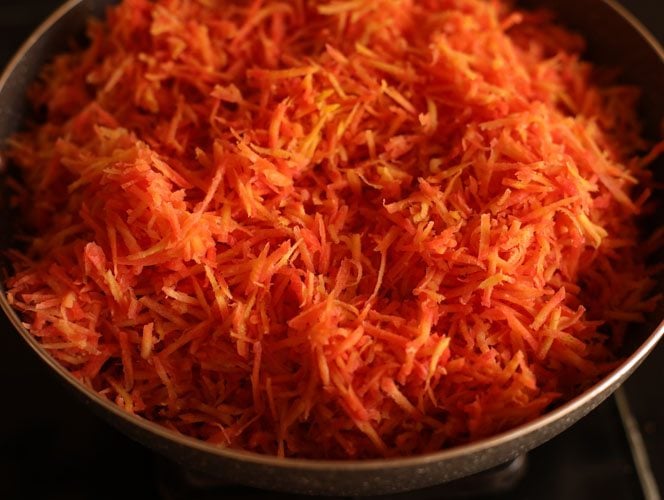
2. On a low heat, sauté carrots in ghee, stirring often until they turn tender and are cooked – about 15 to 20 minutes.
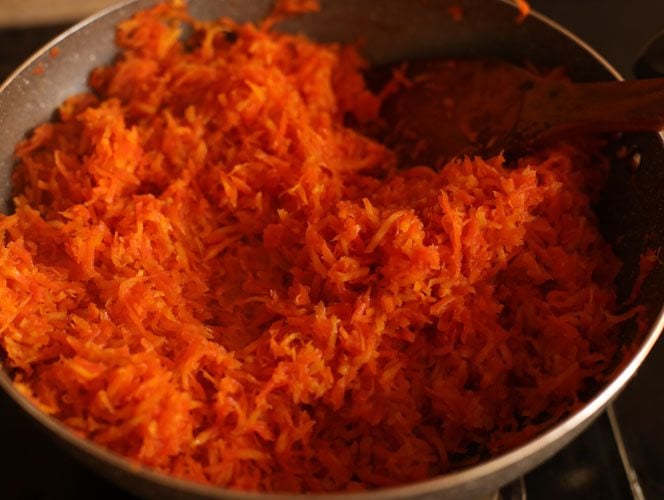
3. Add 2 cups of crumbled or grated khoya (a.k.a. mawa or evaporated milk solids).
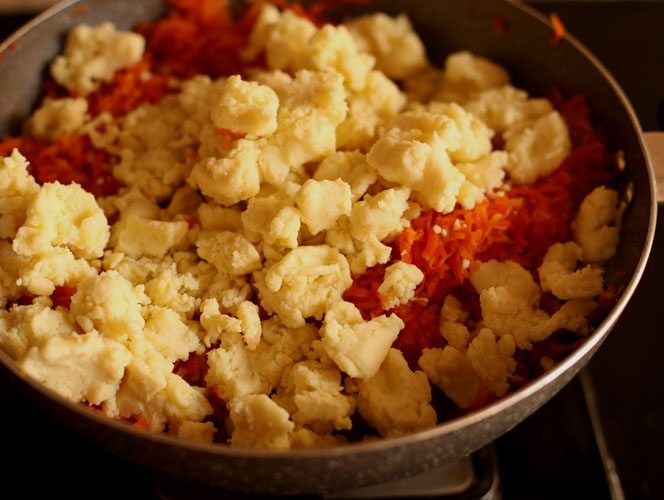
4. First mix thoroughly.
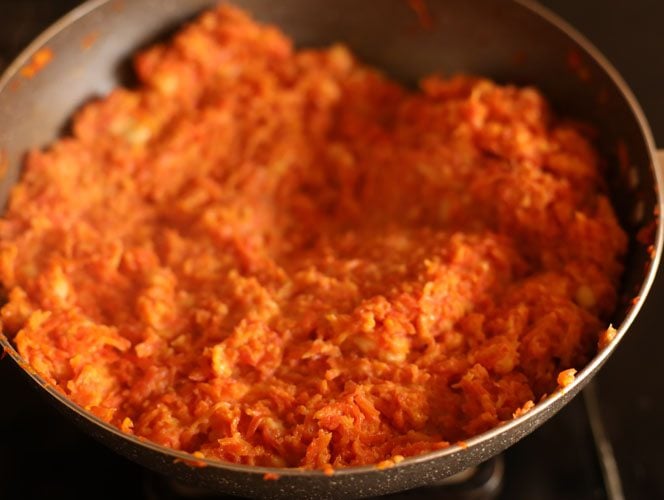
5. Then add 1 to 1.25 cups sugar. Adjust the amount of sugar depending upon the sweetness of your khoya. If your khoya is sweet, start with just 1 cup of sugar.
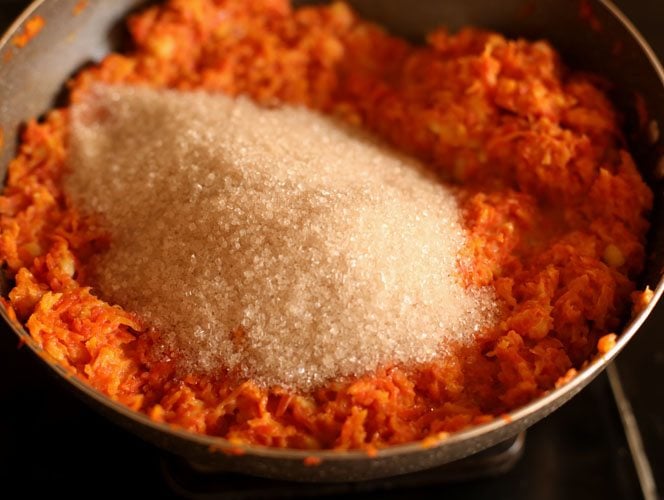
6. Combine and mix well.
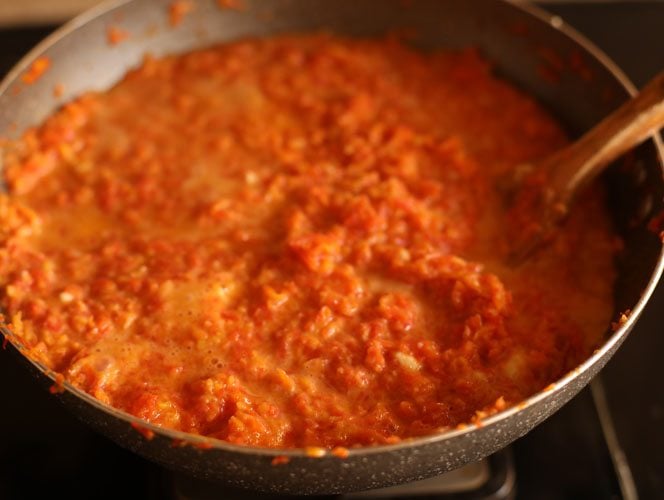
7. You will see that both the khoya and sugar will melt.
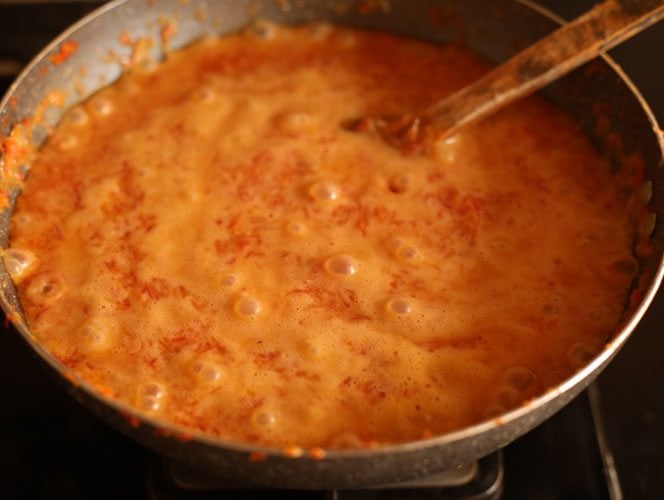
8. Now add ⅓ cup of cashews, ⅓ cup golden raisins, 1 tablespoon pistachios (chopped) and 1.5 to 2 teaspoons cardamom powder.
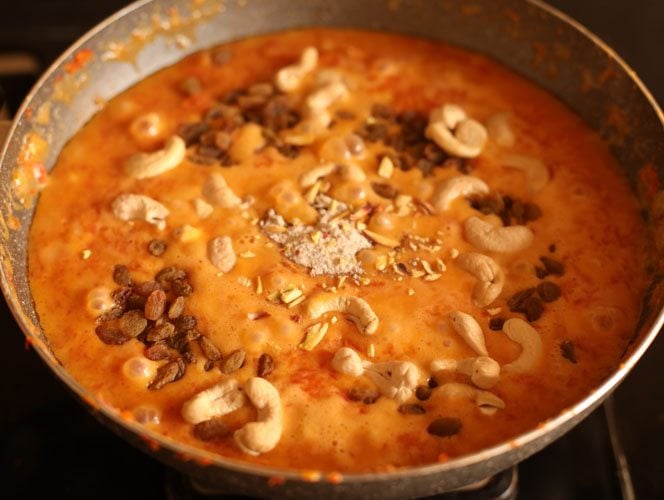
9. Mix again and, stirring often, simmer gajar halwa on low heat. The halwa will start thickening, reducing and leave the edges of the pan. When you see these signs, switch off the heat.
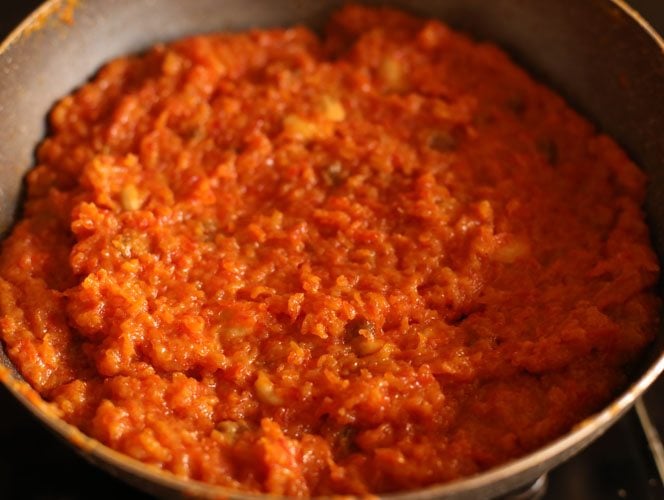
10. Serve gajar ka halwa either warm or chilled.
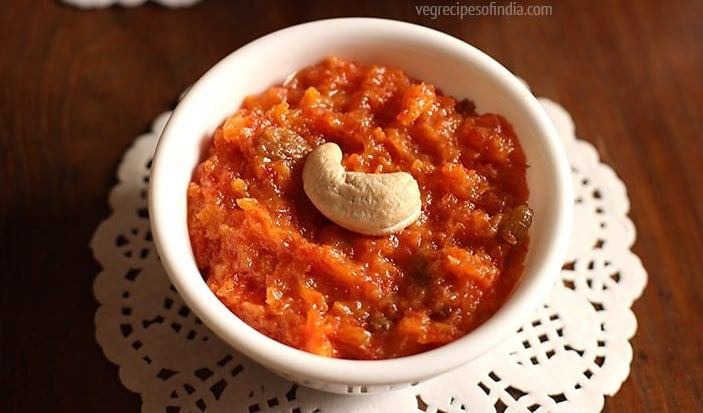
Instant Pot Carrot Halwa
Instant pot gajar halwa! Yes gajar halwa made in the instant pot in about 15 minutes. So obviously a very quick method to make a delicious carrot halwa in the IP.
Earlier I used to make gajar halwa in a stovetop pressure cooker and have now moved on to making it in the instant pot. I have to admit that instant pot is one of my favorite gadgets to cook with. Indian food adapts very well in the instant pot and gives great results.
Traditionally this Indian carrot pudding is slow-cooked and simmered for hours with frequent stirrings. With the instant pot, it just takes 15 minutes to make the halwa with the same taste and texture as the traditionally made one. If you don’t believe me, you have to try it yourself.
Cooking the halwa in the IP requires less handwork and stirrings as compared to the traditional slow-cooked method.
This recipe uses three main ingredients for making the halwa – fresh juicy carrots, milk and sugar. I add some nuts, dry fruits and a bit of cardamom powder for more taste and aroma.
Ingredients
- 500 grams carrots or 4 to 4.5 cups grated carrots
- 1.5 cups full-fat milk or whole milk
- ½ cup sugar or add as required
- 4 tablespoons Ghee (clarified butter)
- 1 tablespoon raisins
- 1 tablespoon cashews – chopped
- 1 tablespoon almonds – sliced
- 1 tablespoon pistachios – sliced
- ½ teaspoon cardamom powder (ground cardamom) or 4 to 5 green cardamoms, powdered in mortar-pestle
Instructions
Making gajar halwa in the Instant Pot is super easy as you do not have to spend time stirring it. Follow these easy steps to make instant pot carrot halwa:
1. Add 4 to 4.5 cups grated carrots, 1.5 cups whole milk, ½ cup sugar, and 4 tablespoons ghee in the steel insert of a 6 quart Instant Pot.
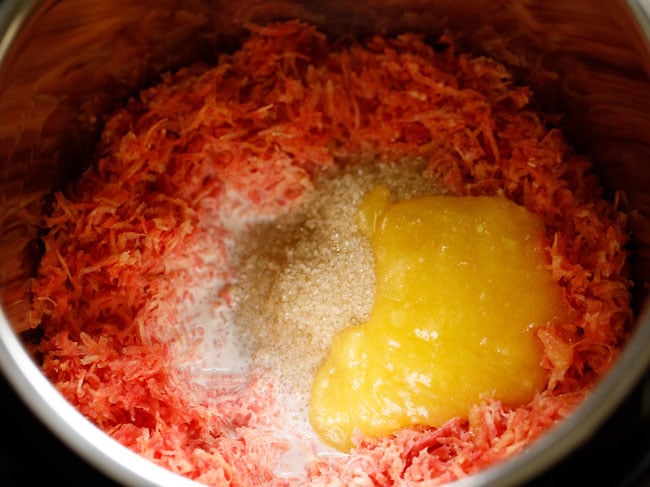
2. Mix all of the ingredients with a spoon to make an even mixture.
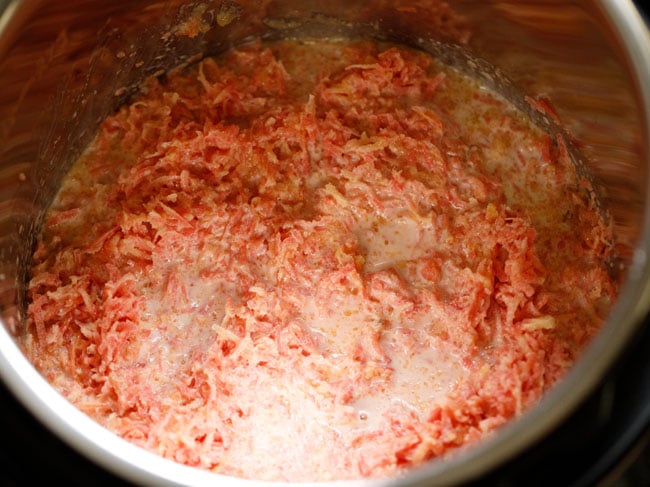
3. Seal with the Instant Pot lid. Position the valve to the sealing position. Pressure cook on high for 3 minutes.
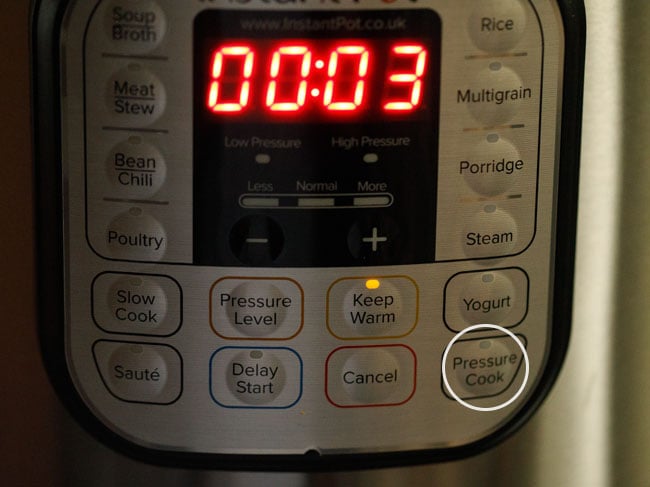
4. After 3 minutes of pressure cooking (it should beep), carefully do a quick pressure release (QPR) by lifting the pressure valve. When all the pressure is released, open the lid. Stir and mix very well.
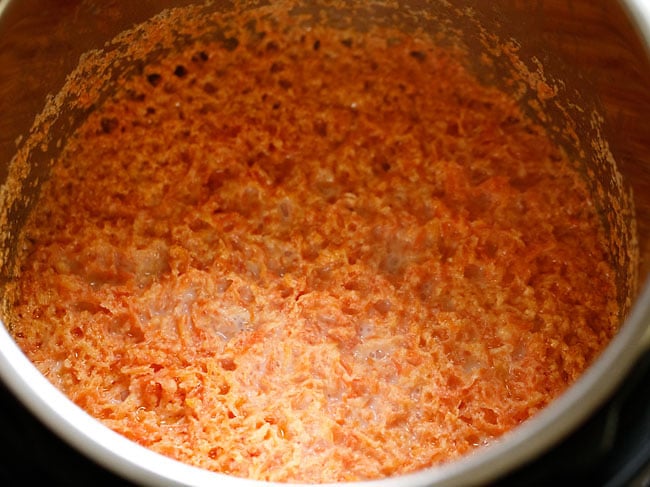
5. Press cancel and then press the sauté button, setting the time to 5 to 10 minutes on normal mode.
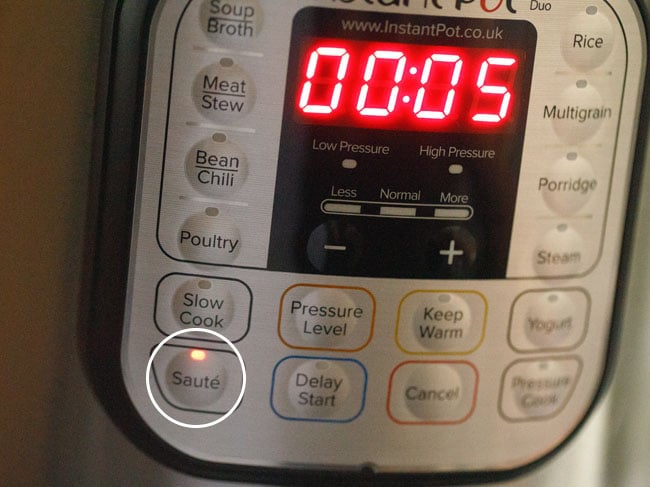
6. The carrot halwa will begin to simmer and bubble. Continue to stir often until the halwa thickens.
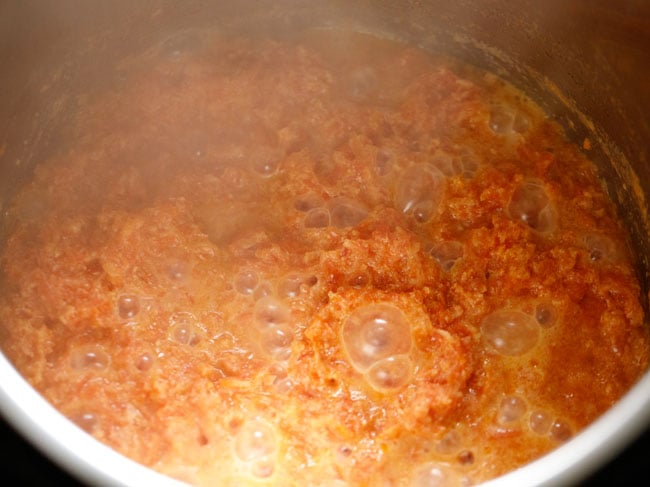
7. When the halwa has almost thickened, add 1 tablespoons each of sliced or chopped almonds, cashews, pistachios and raisins. Add ½ teaspoon cardamom powder.
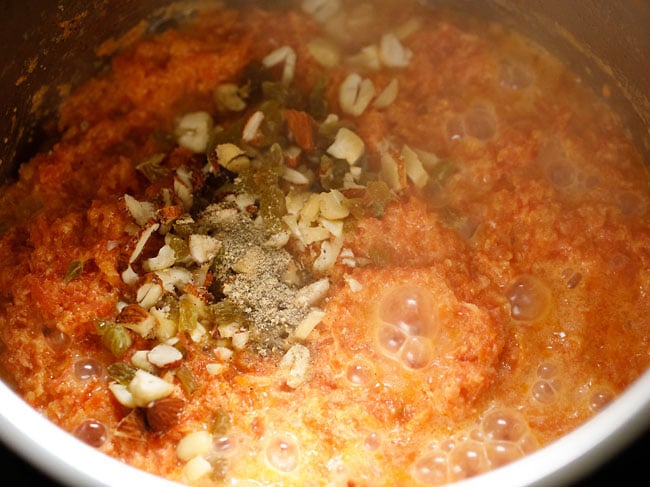
8. Keep on stirring and simmering until the liquids have evaporated and the carrot halwa thickens. The halwa will look glossy and you will some ghee releasing from the sides. Press the cancel button.
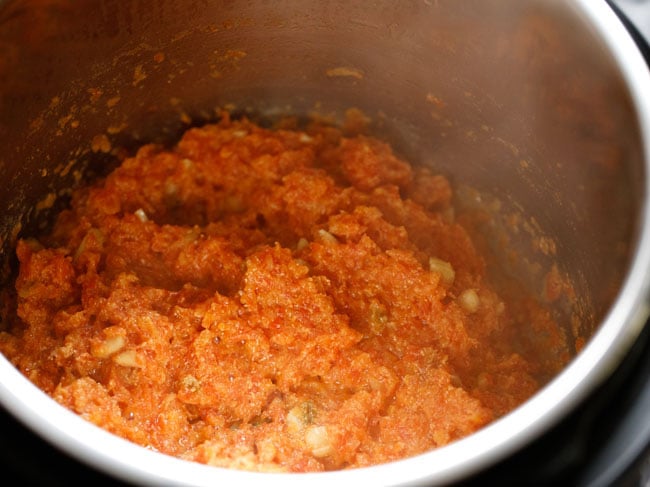
9. Serve instant pot gajar halwa hot or warm.
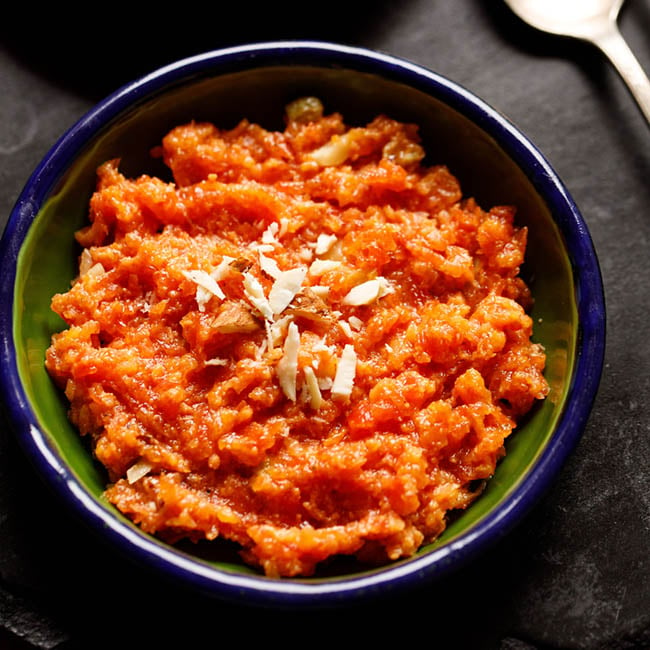
Serving Suggestions
- In the cold winters of North India, carrot halwa is best served hot.
- You can have gajar halwa chilled if you prefer. It is a personal preference, much like some people prefer pudding hot while others prefer it cold.
- In some restaurants, they serve a combination of carrot halwa with vanilla ice cream. Believe me: this combination tastes good. It’s like carrot cake pudding a la mode!
Storage
- Refrigerator: You can store the carrot halwa in the fridge. It stays well for about 10-12 days, but never lasts that long in our house. When serving from leftovers, just warm the halwa and then serve.
- Freezer: Large quantities of carrot halwa can be made and frozen. Gajar halwa keeps well in the freezer for about a month.
Expert Tips
- Buy the best carrots: It is important to buy tender and juicy carrots so that they are easy to grate. Prepare yourself for an arm workout, unless you have a food processor. Even still, you’ll need to keep on stirring them on regular intervals. Small and medium sized carrots are preferable to larger carrots, which can become woody and tough.
- Cooking: Remember to stir the halwa mixture often when you cook it in a pan. Leaving the skillet or pan unattended will make the milk and carrots burn or brown at the bottom of the pan. So stirring regularly and keeping attention on the halwa while its simmering is a must.
- Grating vs. shredding carrot: You can either opt to grate or shred the carrots. The carrots can be grated using a hand-held box grater or a food processor. Obviously, a food processor makes grating of the carrots easier, but it is not necessary.
- Best pan to make carrot halwa: I suggest using a heavy iron skillet or kadai (wok) to make the halwa. You can also use any thick-bottomed pan or skillet.
- Scaling: You can easily halve, double or triple this carrot halwa recipe depending on how many servings you’d like to make.
FAQs
Store carrot halwa in the refrigerator for 10 to 12 days. Do not keep it at room temperature as it will get spoiled. You can even freeze carrot halwa for about a month.
Sure! Simply swap in your favorite non-dairy milk and use coconut oil in place of ghee. But note that coconut oil will give its aroma and flavor to the halwa.
Absolutely! Feel free to use the toasted seeds of your choice instead, or omit them altogether.
More Halwa Recipes To Try!
Please be sure to rate the recipe in the recipe card or leave a comment below if you have made it. For more vegetarian inspirations, Sign Up for my emails or follow me on Instagram, Youtube, Facebook, Pinterest or Twitter.
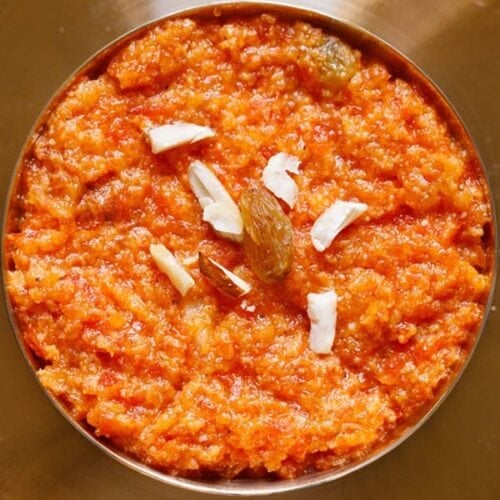
Gajar Ka Halwa | Traditional Carrot Halwa Recipe
Ingredients
- 8 to 9 carrots medium, juicy, tender – 650 grams or about 4 to 4.5 cups grated carrots
- 4 cups whole milk or full fat organic milk
- 4 tablespoons Ghee (clarified butter)
- 10 to 12 tablespoons sugar or raw sugar – 180 to 190 grams – add as required
- ½ to 1 teaspoon cardamom powder or 5 to 6 green cardamoms powdered finely in a mortar-pestle
- 10 to 12 cashews – chopped
- 10 to 12 almonds – sliced or chopped
- 2 tablespoons golden raisins
- 1 pinch saffron strands – optional
Instructions
Preparation
- First rinse, peel and then grate the carrots (8-9 medium sized tender juicy carrots), either with a hand held grater or in a food processor.
- You need approx 4 to 4.5 cups grated carrots.
Making carrot halwa
- In a kadai or deep thick bottomed pan combine milk and grated carrots.
- On a low to medium flame, bring the whole mixture to a boil and then simmer.
- While the mixture is simmering on a low flame, keep on stirring in between.
- The grated carrots will cook in the milk and the milk will start to reduce and evaporate.
- When the milk has 75% reduced, add the ghee, sugar and powdered cardamom to the mixture.
- Stir well and continue to simmer and cook on a low flame.
- Do keep on stirring the halwa in between.
- Towards the end, add the cashews, almonds, saffron and raisins. Simmer the halwa till all the milk is evaporated. Switch off the burner.
- Serve gajar halwa hot, warm or you can also serve it cold. garnish with some chopped dry fruits while serving.
Video
Notes
- Use fresh, juicy and tender carrots for the best texture and taste.
- The recipe can be halved or doubled or tripled according to your needs. Note that if you increase the proportions, it will need a lot of simmering and take more time to cook
- The halwa stays good in the fridge for almost about 10 to 12 days.
- Use full-fat milk or whole milk for the best texture and taste.
- Do not leave the halwa mixture unattended while its simmering and cooking as the ingredients can burn or brown at the bottom of the pan. The carrot halwa mixture has to be stirred often.
- Add nuts and dry fruits of your choice.
Nutrition Info (Approximate Values)
This Carrot Halwa recipe post from the archives, first published on February 2014 has been updated and republished on October 2022.
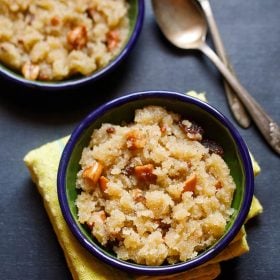
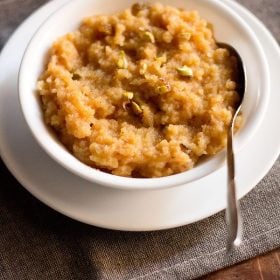
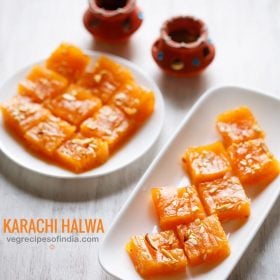
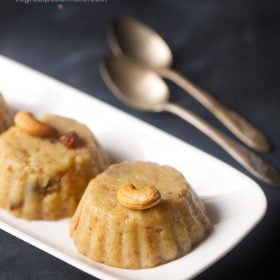
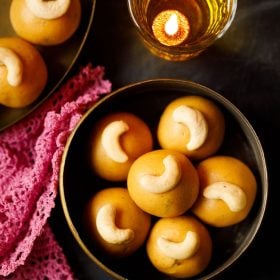
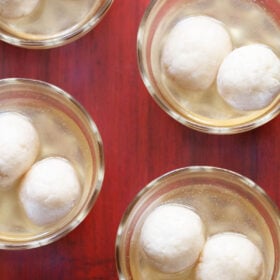
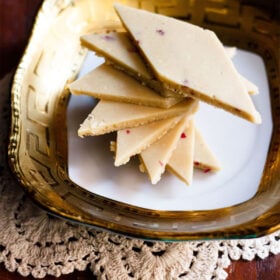








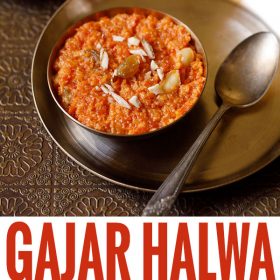
Hi Mam, can we replace sugar with jaggery? If yes please let me know if other changes we need to make in recipe when we add jaggery.
You can replace sugar with jaggery. But with jaggery, it can curdle or split the milk. So I would suggest to add it once the carrot halwa has almost thickened.
After you add jaggery, it will get a slightly fluid consistency, so simmer for a few minutes more. But remember not to overcook after adding jaggery as the halwa can harden.
If the consistency is right for you after you add jaggery and it gets dissolved, then you do not need to simmer or cook further.
You can add the same amount of jaggery as that of sugar mentioned in the recipe. Or add less or more depending on your taste preferences.
Love to make this ❤️
I don’t put any sugar in it and using soya milk. It’s still very sweet and delicious..
Thank you 🙏
I love it !!
Thank you so much ❤️
I do use thick soya milk and it comes out as good as the original version. I am still not ready to remove the ghee though.
Made the traditional and conventional Gajar Halwa without any shortcuts from your recipe. Though it takes time but well worth all the effort. Kids polished it off and have asked me to make it again. Thank you for the great recipe.
Great and thanks for sharing this lovely feedback. Yes the traditional recipe takes time but so delicious!